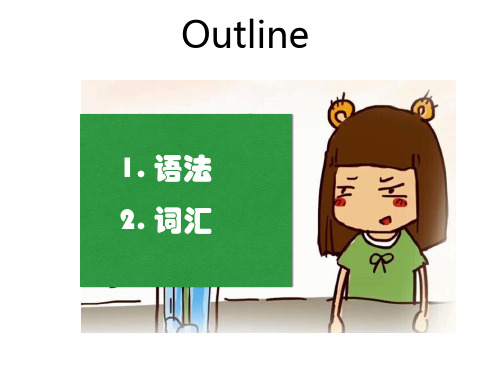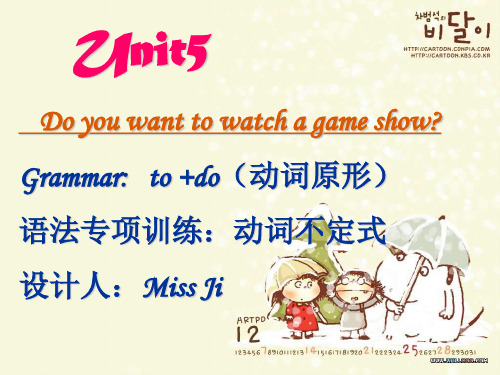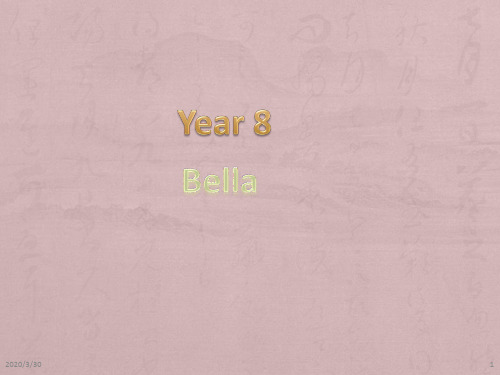人教版新目标八年级上册英语语法总结课件
人教版八年级上册英语unit1词汇语法ppt课件

feel like +句子 感受到
I felt like I was an angel do sth.
I decide to adopt a dog.
n. decision 决定
时态标志词:
last系列: last week/night yesterday系列: yesterday evening ago系列: three days ago in系列: in+过去时间点 其他系列: just now
肯定句 主+was/were+ 其他
He was my boyfriend.
right: + 5 wrong: 对方组+9
1.—Why was he late,Tom?
— He was late ____ he was ill, not ____ the bad weather.
A. because; because of
B. because of; because
C. because; because
D. because of; because of
2. 老鼠和老虎的区别是什么? __W__h_a_t_’_s_t_h_e__d_i_f_f_e_r_e_n_c_e__b_e_t_w_e_e__n_a__m_o__u_s_e_a_n_d__a__t_ig_e_r_?________
right: +4 wrong: 分数除2
—How do you like the 2018 FIFA World Cup Russia?
—It’s very ____. I love it.
A. boring
八年级英语上册第五单元语法_课件人教版.ppt

• •
THE END 8、For man is man and master of his fate.----Tennyson人就是人,是自己命运的主人11:0311:03:108.5.2020Wednesday, August 5, 2020
9、When success comes in the door, it seems, love often goes out the window.-----Joyce Brothers成功来到门前时,爱情往往就走出了窗外。 11:038.5.202011:038.5.202011:0311:03:108.5.202011:038.5.2020
Unit5
Do you want to watch a game show? Grammar: to +do(动词原形) 语法专项训练:动词不定式 设计人:Miss Ji
Do you want to go to a movie?
Yes,I do.
No,I don’t.
Does he/she want to go to a movie? Yes,he/she does. No,he/she doesn’t.
• 10、Life is measured by thought and action, not by time. ——Lubbock 衡量生命的尺度是思想和行为,而不是时间。8.5.20208.5.202011:0311:0311:03:1011:03:10
• 11、To make a lasting marriage we have to overcome self-centeredness.要使婚姻长久,就需克服自我中心意识。Wednesday, August 5, 2020August 20Wednesday, August 5, 20208/5/2020
初中人教版新目标英语八年级上册课件Unit10-SA

培养学生的团队合作 精神,能够在小组活 动中积极参与并合作 完成任务。
02
Teaching content
Analysis of Text Content
01
文本内容分析
02
03
04
总结文章主题和主要观点
分析文章结构和段落关系
探讨作者意图和写作技巧
Words and expressions
词汇和表达 解释词汇的用法和意义
Expand the range of topics and skills covered to provide a broader learning experience for students.
Technical Upkeep
Regularly update and maintain the courseware to ensure it runs smoothly and is compatible with different devices and platforms.
培养学生的阅读理解能力,能 够理解并分析文章中的信息。
培养学生的写作能力,能够运 用所学词汇和语法点进行简单 的写作。
培养学生的口语表达能力,能 够运用所学词汇和语法点进行 简单的口语交流。
Emotional goals
培养学生的环保意识 ,认识到人与自然和 谐共生的重要性。
培养学生的自信心, 鼓励学生在课堂上积 极发言并表达自己的 观点。
学生互评与教师点评
组织学生进行互评,教师对学生的练习进行点评,指出优点和不足 ,帮助学生进一步提高。
Consolidation stage
总结与回顾
对本节课所学内容进行总结与回 顾,帮助学生加深记忆和理解。
人教版新目标八年级上册英语语法知识点

人教版新目标八年级上册英语语法知识点(一)一般将来时一般将来时表示将来某个时间要发生的动作或者存在的状态。
通常与表示将来的时间状语连用,如tomorrow, the day after tomorrow, next year, next month, next week, in 100 years等。
be going to do(动词原形)结构:表示打算、准备做的事情或者肯定要发生的事情。
如:It is going to rain.will do结构表示将来的用法:1. 表示预见Do you think it will rain?You will feel better after a good rest.2. 表示意图I will borrow a book from our school library tomorrow.What will she do tomorrow?基本构成如下:一般疑问句构成:(1)will+主语+do…? Will Sarah come to visit me next Sunday?(2)there be 结构的一般疑问句:Will there + be …?Will there be fewer trees? Yes, there will. / No, there won’t否定句构成:will + not (won’t)+doSarah won’t come to visit me next Sunday.特殊疑问句构成:特殊疑问词+will+主语+…?What will Sarah do next Sunday?★★练一练★★根据例句,用will改写下列各句例:I don’t feel well today. (be better tomorrow)I’ll be better tomorrow.1. Gina has six classes today. (have a lot of homework tonight)_____________________________2. I’m tired now. (sleep later)_____________________________3. My parents need a new car. (buy one soon)_____________________________4. We can’t leave right now. (leave a little later)_____________________________5. The weather is awful today. (be better tomorrow)_____________________________答案:1. She’ll have a lot of homework tonight.2. I’ll sleep later.3. They’ll buy one soon.4. We’ll leave a little later.5. Maybe it’ll be better tomorrow.(二)should的用法:should用来提出建议和忠告,后边加动词原形,否定句直接在should后边加not.例如:I think you should eat less junk food.我认为你应该少吃垃圾食品。
新目标八年级英语上册unit2语法总结

新目标八年级英语上册unit2语法总结新目标八年级英语上册unit2语法总结Unit2What’sthematter?1.kindof=abit=alittle一点儿(表示程度) e.gI’mkindof/abit/alittleunhealthy.我有点儿不安康。
2.alittle+n.=abitof+n3.should,can,will,would,may,need,must这些情态动词不能加S,没有第三人称单数形式。
4.starttodosth=startdoingsth开头做某事5.wish/hopetodosth Wishsbtodosth(此处wish不能改为hope,没有hopesbtodosth的用法)6.Ihopeso我盼望如此。
否认形式:Ihopenot.我不盼望如此。
7.Ithinkso.否认:Idon’tthinkso.3aAhealthylifestyle,theChineseway8.insomeways在某些方面9.onone’swayto+n在某人去的道路上(onmywaytoschool在我去学校的路上onmywaytosuccess在我通往胜利的道路上)10.inthisway用这种方法e.gInthisway,youcangetgoodgrades.11.abalanceofAandBA和B的平衡12.forexample举个例子13.needtodosth需要做某事e.gIneedtocutmyhair.我需要理发。
Needdoingsth=needtobedone需要被做某事e.gMyhairneedcutting.=Myhairneedtobecut.我的头发需要被剪。
14.sthbepopularwithsbe.gChinesemedicineisnowpopularwithpeopleinwesterncountries.15.I t’s+adj.(形容词)+todosth做某事怎么样e.gIt’seasytohaveahealthylifestyle.It’simportanttohavegoodhabits.16.believe认为e.gIbelieveit’simportanttosleepeighthoursanight.我认为每晚睡八小时很重要。
2022 人教版英语八年级上册unit9--10单元语法复习课件

单项选择
4. What about _____ me a hand, Mary?
A. give
B. gives
C. giving
D. to give
5. Here is my phone number. You _____ call me anytime you like.
A. can
B. must
句型转换
4. Can you go shopping with me next Sunday? (改为同义句) ______________________ to go shopping with me next Sunday?
5. Why don’t you come here by bus? (改为同义句) ______________ come here by bus?
e.g. What about going fishing? = How about going fishing?
03
Grammar Focus
Can you come to my party on Saturday? Sure, I’d love to. Sorry, I must study for a math test.
拓展:
(2) 其他常见的表示请求的句式 Shall we….? “我们….好吗?” shall是情态动词,后面接动词原形。 e.g. Shall we go shopping tomorrow?
拓展:
(2) 其他常见的表示请求的句式 Let’s…! “让我们…吧!” let是使役动词。其后跟动词原形。 e.g. Let’s play basketball after class.
04
(人教版新目标)八年级英语上册全册各单元知识点期末总复习讲解教学课件

3. feel like “感受到;摸起来”,后跟宾语 从句或名词。 I felt like I was a bird. 我感觉我是一只鸟。 It feels like a stone. 它摸起来像一块石头。
eg.something special; somewhere wonderful. 2.不定代词做主语时,谓语动词用第三人称单数。 eg.Is everybody here? 大家都到齐了吗?
1. get to/reach/arrive 都是“到达“的意思。
get to+sp=reach+sp = arrive at+sp(小)=arrive in+sp(大) 若他们后面要加地点副词here, there, home等,则 不需要加介词。
25、up and down上上下下 26、come up出来 27、enjoy oneself=have fun=have a good time
玩的开心
二、重要句子(语法):
1.Where did you go on vacation? 你到哪里去度假了?
I went to New York City. 我去了纽约城。
三、习惯用法、搭配
1. buy sth. for ab./ buy sb. sth. 为某人买某物 2. taste + adj. 尝起来…… 3. nothing to do but do除了……之外无事可干 4. seem + (to be) + adj 看起来 5. arrive in + 大地方 / arrive at + 小地方 到达某地 6. decide to do sth=make a decision决定做某事 7. try doing sth. 尝试做某事
人教版新目标八年级上册英语语法知识点

人教版新目标八年级上册英语语法知识点Revised by BETTY on December 25,2020人教版新目标八年级上册英语语法知识点(一)一般将来时一般将来时表示将来某个时间要发生的动作或者存在的状态。
通常与表示将来的时间状语连用,如tomorrow, the day after tomorrow, next year, next month, next week, in 100 years等。
be going to do(动词原形)结构:表示打算、准备做的事情或者肯定要发生的事情。
如:It is going to rain.will do结构表示将来的用法:1. 表示预见Do you think it will rainYou will feel better after a good rest.2. 表示意图I will borrow a book from our school library tomorrow.What will she do tomorrow基本构成如下:一般疑问句构成:(1)will+主语+do… Will Sarah come to visit me next Sunday(2)there be 结构的一般疑问句:Will there + be …Will there be fewer trees Yes, there will. / No, there won’t否定句构成:will + not (won’t)+doSarah won’t come to visit me next Sunday.特殊疑问句构成:特殊疑问词+will+主语+…What will Sarah do next Sunday★★练一练★★根据例句,用will改写下列各句例:I don’t feel well today. (be better tomorrow)I’ll be better tomorrow.1. Gina has six classes today. (have a lot of homework tonight)_____________________________2. I’m tired now. (sleep later)_____________________________3. My parents need a new car. (buy one soon)_____________________________4. We can’t leave right now. (leave a little later)_____________________________5. The weather is awful today. (be better tomorrow)_____________________________答案:1. She’ll have a lot of homework tonight.2. I’ll sleep later.3. They’ll buy one soon.4. We’ll leave a little later.5. Maybe it’ll be better tomorrow.(二)should的用法:should用来提出建议和忠告,后边加动词原形,否定句直接在should后边加not.例如:I think you should eat less junk food.我认为你应该少吃垃圾食品。
Unit 3 单元语法-八年级上册英语课件(人教版)

Listen for questions.
Julie: Did you like the singing competition yesterday,Anna?
Anna: Oh, it was fantastic! Nelly sang so well! Julie: Well, I think Lisa sang better than Nelly. Anna: Oh,which one was Lisa? Julie: The one with shorter hair. I think she sang
Lisa sings more前lo面ud+ly_t_mh_ao_nr_eN__elly.
Nelly
Lisa
outgoing
serious
popular
sing loudly
Let’s choose, draw and say. have many fr•ien比ds较级pl:ay不th规e d则ru变m化s w:ell is bad in dan•cingood/wehlal v—e l_it_bt_lee_tt_tei_mr_e
YNeos.. LNies_lal’_ys_ihs_a__iar__si__as_s_n_t_o_at__ll__+a__sa_形_s___l__/o__副_n___g___原a___s_L_形_Ni_sea__l._l_y_’_+s__._a_s______ Nelly’s•hair原is级__th的_r_e_否e_t_i定m__e句_s__型(t:wice/three times) as long_a_s _L_ins_oa_’ts_. ___ + ____a_s_____ +
新目标人教版英语初二八年级重点语法点整理 PPT课件

2020/3/30
14
+ (一)can、might(上U9, 下Unit3) + 表可能性 (can用在邀请语境,重点是怎么回答) + Can you come to my party on Saturday? + -Sure , I’d love to. + -Sorry, I must study for a math test. + -No, I’m not free. I might have to meet a friend.
as soon as …… if unless …… …so….that… …… …so that… ……
although …… as…as.. 比较级+than
下U5
下U4 下U6 上U10 下U6 下U6 下U4
下U4 上U3
We were eating dinner in the kitchen when we heard the news on the radio. While John was taking photos, Mary bought a drink. You shouldn’t wait until the last minute to study for a test. As soon as the prince saw her, he fell in love with her.
the two.
+ 2. as…(adj./adv.原级) as… (u3) + Does Tara works as hard as Tina (does)? 难点
+ 3. 拓展
2020/3/30
6
(二)最高级——adj. adv. (上u3,u4,下u7) + 1. (adj. ) the + –(i)est ; most /least + Mercury is the closest to the sun. + Paris is one of the most romantic cities in the world.
人教版新目标英语八年级上册 Unit1 - 2 复习课件(共28张PPT)

课前请准备好: 1.八上课本 2.升学锦囊 3.听写本
(按上学期的要求准备)
4.黑笔、红笔、荧光笔
一、重点单词(课本p121-p123) 二、基础知识(课本p1-p16)
复习流程
三、高频考点聚焦(锦囊p27-29) 四、当堂检测(锦囊p29+p169)
一、重点单词(课本p121-p123)
_______a difference a day makes! They wanted to walk up to the top, but it started raining so they decided to take the train. When they got to the top, it was raining really_______(猛烈地). We didn’t have an umbrella so we were wet and cold. Because _____the bad weather, we couldn’t see _________(任何东西)below. We had one bowl of rice and some fish. The food tasted ________(great) because I was so hungry.
要求:暂停播放,自己复习U1-2单词,3min后听写。 1.AB层:注意单词的意思、词性、固定搭配等。 2.C层:只背黑色标注单词及词组
听写内容(c层写基本单词即可)
1.任何人 2.每人;所有人 3.一件令人愉悦的事 4.决定做某事 5.给…的感觉
6.wonder 7.差别,差异 8.一把伞
9.hardly 10.节目
▲语法-不定代词
人教版英语八年级上册Unit 1 总复习课件PPT(共18页)

Did you buy anything special?你买了什么特别的东西吗? Yes, I bought something for my father.对,我给父亲买了一 些东西。
How was the food? 食物怎么样? Everything tasted really good.每一样东西真的都好吃。
人教版英语八年级上册Unit 1 总复习课件(共18张PPT)
人教版英语八年级上册Unit 1 总复习课件(共18张PPT)
三、习惯用法、搭配 11. stop doing sth. 停止做某事 12. look + adj 看起来 13. dislike doing sth. 不喜欢做某事 14. Why not do sth. 为什么不做…….呢? 15. so + adj + that + 从句 如此……以至于…… 16. tell sb. (not) to do sth. 告诉某人(不要) 做某事 17. keep doing sth. 继续做某事/一直做某事 18. forget to do sth. 忘记去做某事 / forget doing sth 忘记做 过某事
- 1、下载文档前请自行甄别文档内容的完整性,平台不提供额外的编辑、内容补充、找答案等附加服务。
- 2、"仅部分预览"的文档,不可在线预览部分如存在完整性等问题,可反馈申请退款(可完整预览的文档不适用该条件!)。
- 3、如文档侵犯您的权益,请联系客服反馈,我们会尽快为您处理(人工客服工作时间:9:00-18:30)。
• a. 表示时态,例如: He is singing. 他在唱歌。 He has got married. 他已结婚。
b. 表示语态,例如: He was sent to England. 他被派往英国。
c. 构成疑问句,例如: Do you like college life? 你喜欢大学生
新目标八年级英语上册语法复习 1) leave的用法 1.“leave+地点”表示“离开某地”。例如:
When did you leave Shanghai? 你什么时候离开上海的? 2.“leave for+地点”表示“动身去某地”。例如: Next Friday, Alice is leaving for London. 下周五,爱丽斯要去伦敦了。 3.“leave+地点+for+地点”表示“离开某地去某
地”。例如: Why are you leaving Shanghai for Beijing?
你为什么要离开上海去北京?
1
• 2) 情态动词should“应该”学会使用
• should作为情态动词用,常常表示意外、 惊奇、不能理解等,有“竟会”的意思, 例如:
• How should I know? 我怎么知道?
活吗? Did you study English before you came
here?
• 你来这儿之前学过英语吗? d. 与否定副词not合用,构成否定句,例如: I don't like him. 我不喜欢他。
10
• e. 加强语气,例如: Do come to the party tomorrow evening. 明天
• sometimes(有时候)never(从不)
• 2.频度副词的位置:
• a.放在连系动词、助动词或情态动词后面。如:
• David is often arrives late for school.大卫上学经常 迟到。
•
b.放在行为动词前。如:
• We usually go to school at 7:10 every day.
• 职业。如:
What is your father? 你父亲是干什么的?
•
该句相当于:
• What does your father do?
What is your father's job?
• Which 指代的是特定范围内的某一个人。如:
• ---Which is Peter? 哪个是皮特?
• ---The boy behind Mary. 玛丽背后的那个男孩。
yellow?
•
你最喜爱哪一种颜色? (有特定的范围)
• 3. what 与 which 后都可以接单、复数名词和 不可数名词。如:
•
Which pictures are from China? 哪些图片
来自中国?
5
• 4) 频度副词的位置
1.常见的频度副词有以下这些:
always(总是,一直)usually(通常)often(常常, 经常)
• 2. everyday 作定语,译为“日常的”。
•
She watches everyday English on TV after
dinner.
•
她晚饭后在电视上看日常英语。
8
• What's your everyday activity? 你的日常活 动是什么?
• 6) 什么是助动词 • 1.协助主要动词构成谓语动词词组的词叫助动词
• Why should you be so late today? 你今天为什 么来得这么晚?
should有时表示应当做或发生的事,例如:
We should help each other.我们应当互相帮助。
• 我们在使用时要注意以下几点:
2
• 1. 用于表示“应该”或“不应该”的概念。此时常指 长辈教导或责备晚辈。
• 我们每天经常在7:10去上学。
6
• c.有些频度副词可放在句首或句尾,用来表示强 调。如:
Sometimes I walk home, sometime I ride a bike. • 有时我步行回家,有时我骑自行车。 • 3.never放在句首时,主语、谓语动词要倒装。如: • Never have I been there.我从没到过那儿。
7
• 5) every day 与 everyday
• 1. every day 作状语,译为“每一天”。如:
•
We go to school at 7:10 every day.
•
我们每天7:10去上学。
•
I decide to read English every day.
•
我决定每天读英语。
常出现的考点之一。例如:
•
We should arrive by supper time. 我们在晚饭前就能
到了。
•
She should be here any moment. 她随时都可能来。
3
• 3) What...? 与 Which...?
• 1. what 与 which 都是疑问代词,都可以指人或 事物,但是what仅用来询问
4ቤተ መጻሕፍቲ ባይዱ
• 2. What...? 是泛指,所指的事物没有范围的限制; 而 Which...? 是特指,
• 所指的事物有范围的限制。如:
•
What color do you like best?(所有颜色)
你最喜爱什么颜色?
•
Which color do you like best, blue, green or
(Auxiliary Verb)。被协助的 • 动词称作主要动词(Main Verb)。助动词自身没
有词义,不可单独使用, • 例如:
He doesn't like English. 他不喜欢英语。 (doesn't是助动词,无词义;like是主要动 词,有词义) 2.助动词协助主要动词完成以下功用,可以用来:
• 例如:
•
You should be here with clean hands. 你应该把手洗
干净了再来。
•
2. 用于提出意见劝导别人。例如:
•
You should go to the doctor if you feel ill.
• 如果你感觉不舒服,你最好去看医生。
•
3. 用于表示可能性。should的这一用法是考试中常
